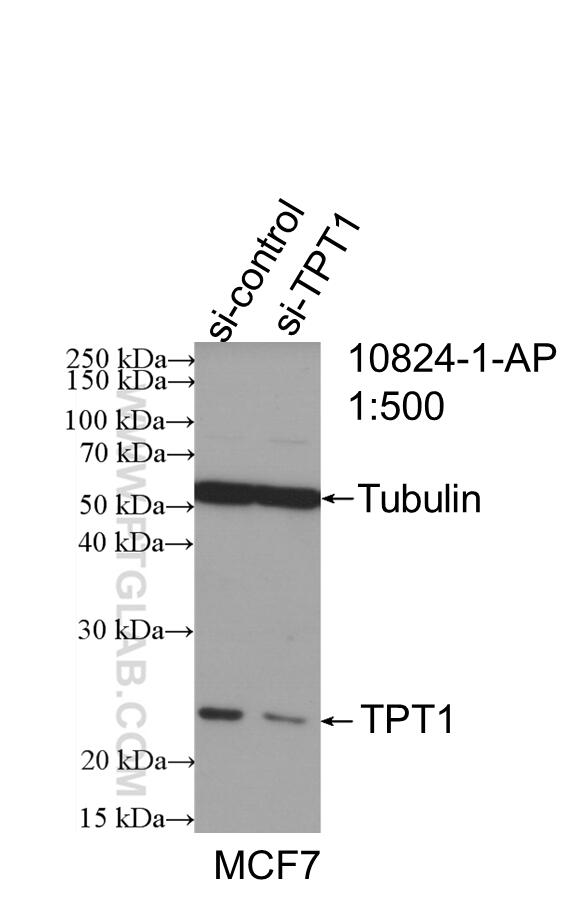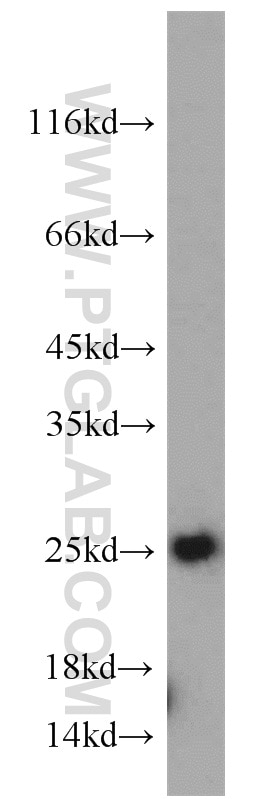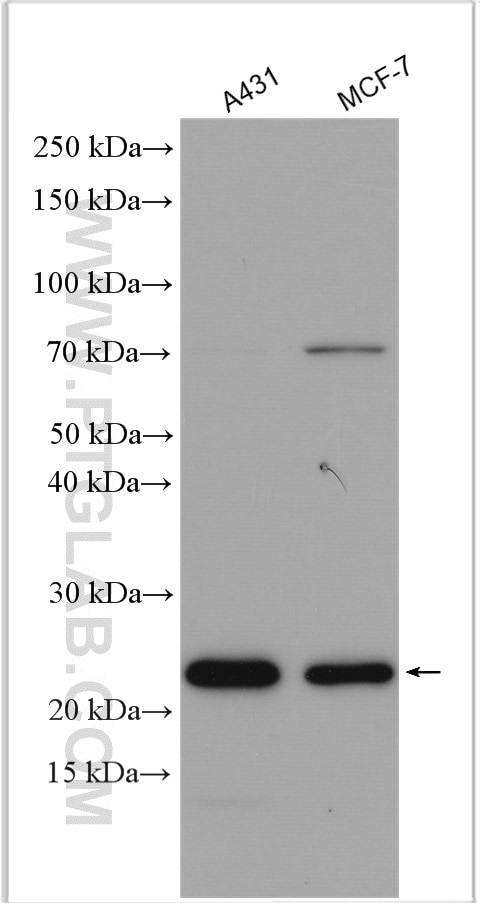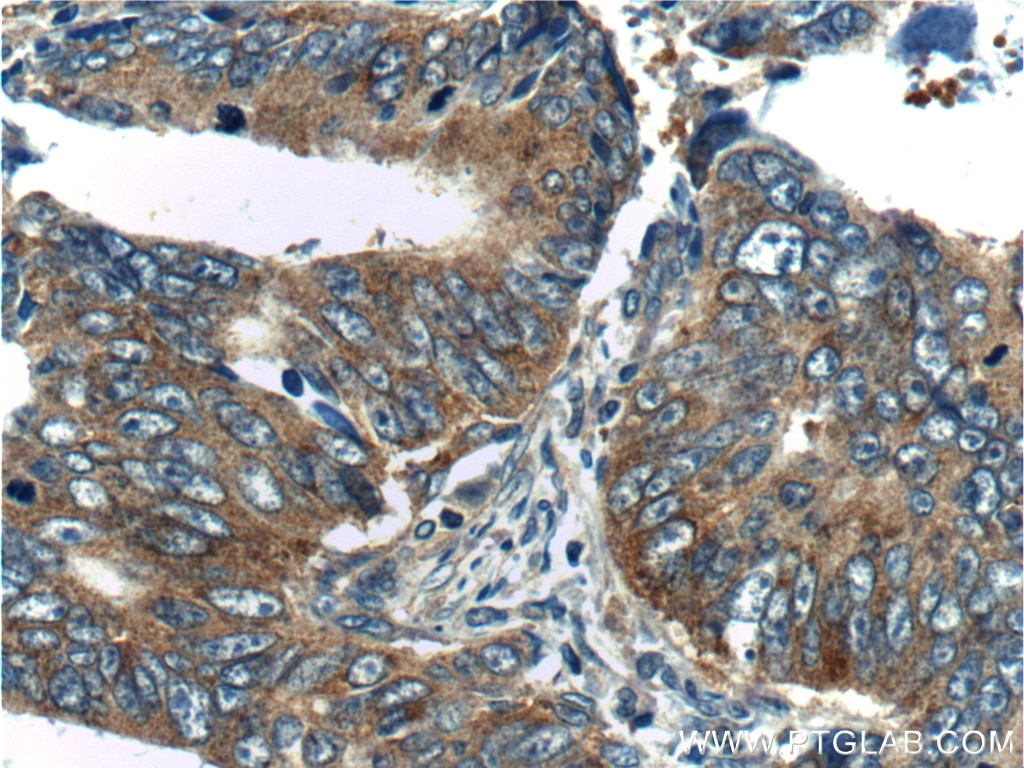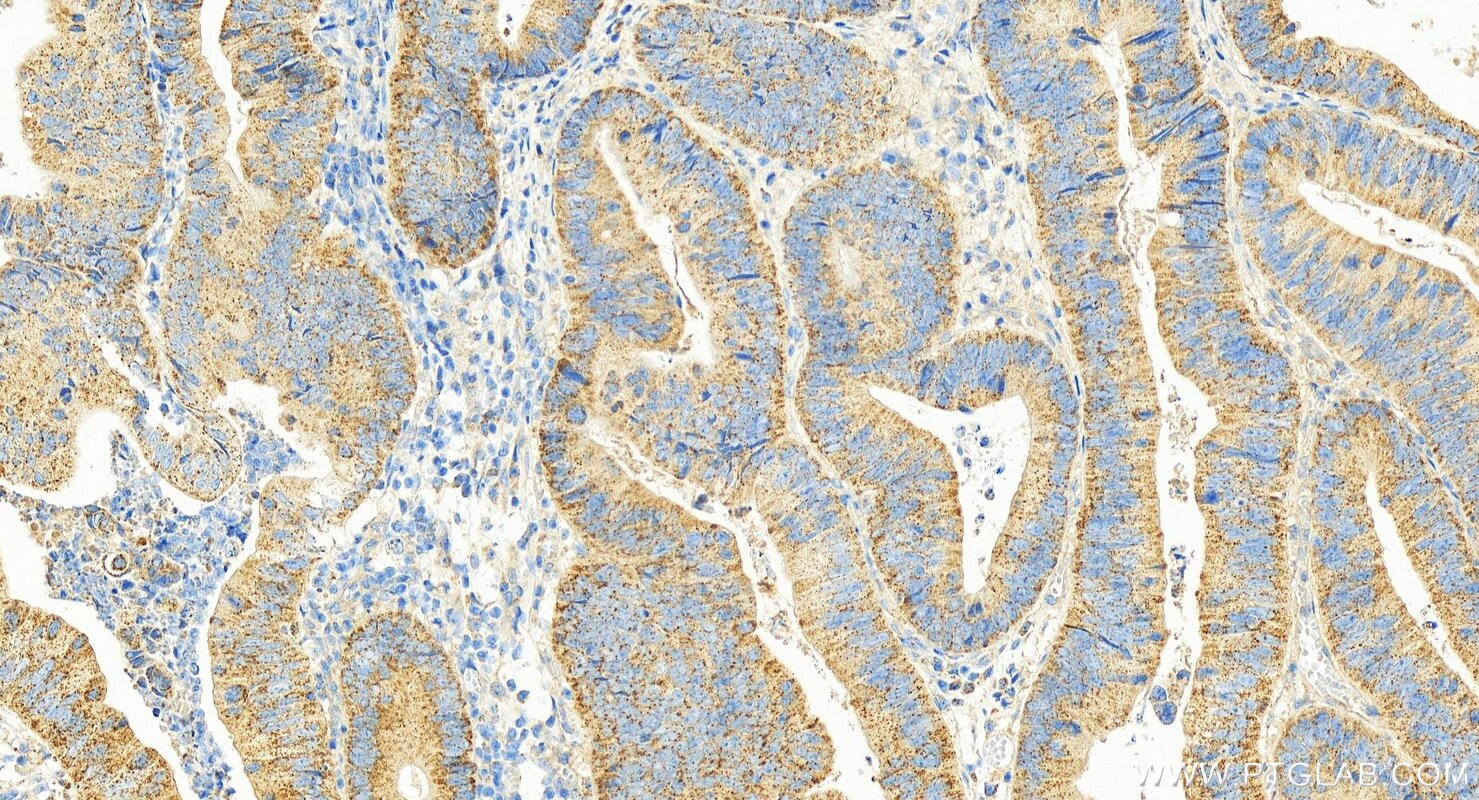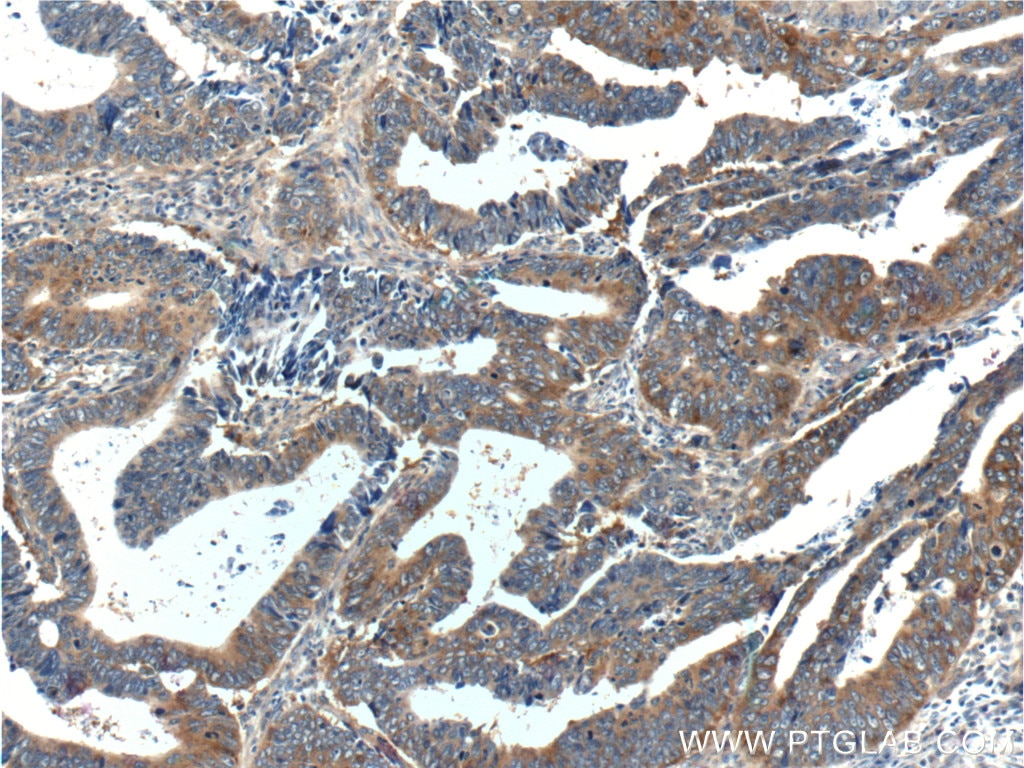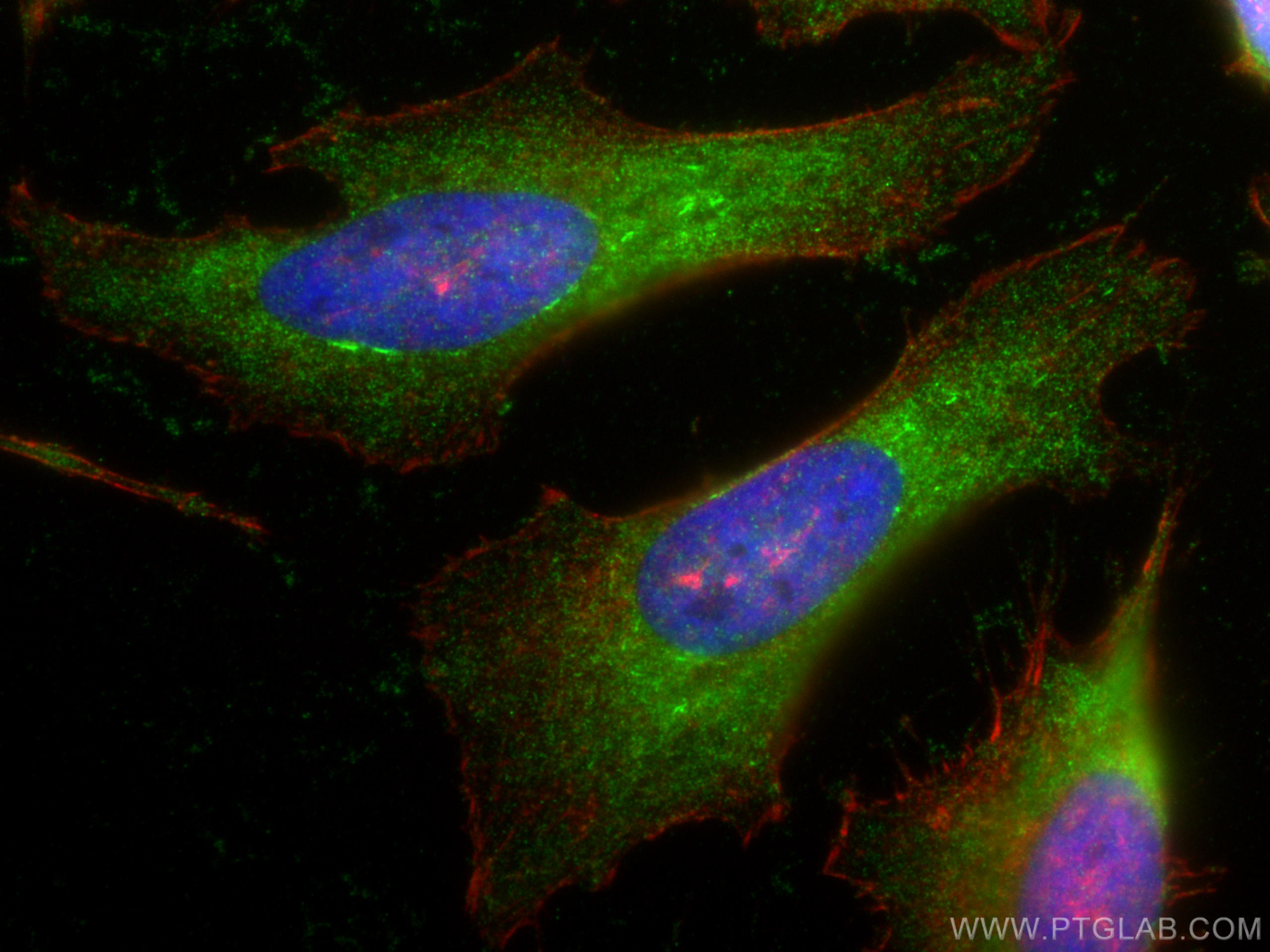- Phare
- Validé par KD/KO
Anticorps Polyclonal de lapin anti-TPT1
TPT1 Polyclonal Antibody for WB, IHC, IF/ICC, ELISA
Hôte / Isotype
Lapin / IgG
Réactivité testée
Humain, rat, souris et plus (1)
Applications
WB, IHC, IF/ICC, ELISA
Conjugaison
Non conjugué
N° de cat : 10824-1-AP
Synonymes
Galerie de données de validation
Applications testées
| Résultats positifs en WB | cellules A431, cellules MCF-7, tissu placentaire de souris |
| Résultats positifs en IHC | tissu de cancer du côlon humain, il est suggéré de démasquer l'antigène avec un tampon de TE buffer pH 9.0; (*) À défaut, 'le démasquage de l'antigène peut être 'effectué avec un tampon citrate pH 6,0. |
| Résultats positifs en IF/ICC | cellules HeLa, |
Dilution recommandée
| Application | Dilution |
|---|---|
| Western Blot (WB) | WB : 1:1000-1:8000 |
| Immunohistochimie (IHC) | IHC : 1:1000-1:4000 |
| Immunofluorescence (IF)/ICC | IF/ICC : 1:200-1:800 |
| It is recommended that this reagent should be titrated in each testing system to obtain optimal results. | |
| Sample-dependent, check data in validation data gallery | |
Applications publiées
| KD/KO | See 1 publications below |
| WB | See 6 publications below |
| IHC | See 2 publications below |
| IF | See 3 publications below |
Informations sur le produit
10824-1-AP cible TPT1 dans les applications de WB, IHC, IF/ICC, ELISA et montre une réactivité avec des échantillons Humain, rat, souris
| Réactivité | Humain, rat, souris |
| Réactivité citée | rat, Humain, porc, souris |
| Hôte / Isotype | Lapin / IgG |
| Clonalité | Polyclonal |
| Type | Anticorps |
| Immunogène | TPT1 Protéine recombinante Ag1268 |
| Nom complet | tumor protein, translationally-controlled 1 |
| Masse moléculaire calculée | 20 kDa |
| Poids moléculaire observé | 22-25 kDa |
| Numéro d’acquisition GenBank | BC003352 |
| Symbole du gène | TPT1 |
| Identification du gène (NCBI) | 7178 |
| Conjugaison | Non conjugué |
| Forme | Liquide |
| Méthode de purification | Purification par affinité contre l'antigène |
| Tampon de stockage | PBS with 0.02% sodium azide and 50% glycerol |
| Conditions de stockage | Stocker à -20°C. Stable pendant un an après l'expédition. L'aliquotage n'est pas nécessaire pour le stockage à -20oC Les 20ul contiennent 0,1% de BSA. |
Informations générales
The translationally controlled tumor protein (TPT1, also known as TCTP) is a highly conserved, abundantly expressed protein associated with cell growth and apoptosis regulation. It is overexpressed in most tumor cells and its down-regulation decreases the viability of those cells. This antibody detected 22-25 kDa TPT1 in lysates. An additional band around 50 kDa can also be observed occasionally, possibly representing the dimer form of TPT1.
Protocole
| Product Specific Protocols | |
|---|---|
| WB protocol for TPT1 antibody 10824-1-AP | Download protocol |
| IHC protocol for TPT1 antibody 10824-1-AP | Download protocol |
| IF protocol for TPT1 antibody 10824-1-AP | Download protocol |
| Standard Protocols | |
|---|---|
| Click here to view our Standard Protocols |
Publications
| Species | Application | Title |
|---|---|---|
Pharmacol Res Tubocapsenolide A targets C-terminal cysteine residues of HSP90 to exert the anti-tumor effect. | ||
Int J Biol Sci Ailanthus Altissima-derived Ailanthone enhances Gastric Cancer Cell Apoptosis by Inducing the Repression of Base Excision Repair by Downregulating p23 Expression. | ||
Chem Biol Interact AMG900 as novel inhibitor of the translationally controlled tumor protein. | ||
Invest New Drugs A novel ligand of the translationally controlled tumor protein (TCTP) identified by virtual drug screening for cancer differentiation therapy. | ||
BMC Cancer Identification of proteins involved in neural progenitor cell targeting of gliomas. | ||
Cancer Sci LncRNA TPT1-AS1 promotes tumorigenesis and metastasis in epithelial ovarian cancer by inducing TPT1 expression.
|
